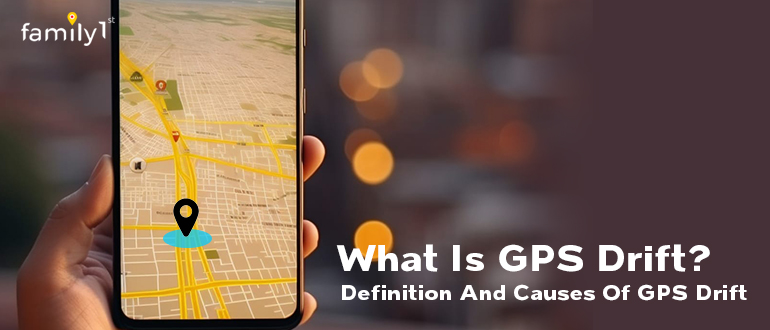Key Takeaways:
- GPS drift is when your GPS shows an inaccurate location due to factors like signal interference or environmental obstacles.
- Key causes of GPS drift include tall buildings, bad weather, natural terrain, satellite positions, and solar activity.
- Practical solutions to minimize GPS drift include maintaining a clear line of sight, using offline maps, calibrating your device, and relying on multiple navigation sources.
- The Family1st Portable GPS Tracker offers accurate tracking with features like geofencing, long battery life, water resistance, and 4G connectivity.
Table of Contents
What is GPS drift?
GPS drift is when a GPS device shows your location slightly off from where you actually are. Even if you stay in one place, the GPS might act like you’re moving.
Think of it as a game of hide and seek, where echoes make it hard to tell where someone is hiding. Similarly, things like tall buildings or signal interference confuse the GPS, causing location errors.
Factors Causing GPS Drift
Understanding what causes GPS drift helps in finding ways to reduce its impact. Below are the main factors that lead to GPS inaccuracies:
Tall Buildings
GPS drift happens near tall buildings because signals bounce off their surfaces. This reflection creates “multi path interference,” where signals take multiple routes to reach the device, confusing its location accuracy.
Weather
Bad weather, like heavy rain or snow, affects GPS signals. Water droplets or ice scatter the signals, making it harder for the GPS device to receive clear and accurate data.
Trees and Mountains
Dense forests and mountains block or reflect GPS signals. This interference, similar to how obstacles block radio waves, causes errors in the device’s location readings.
Satellite Positions
GPS drift increases when satellites are not well-positioned in the sky. If the device doesn’t connect to enough satellites, it struggles to calculate the correct location.
Atmospheric Conditions
The Earth’s atmosphere can slow down GPS signals as they travel. This delay, caused by the bending or slowing of signals in the atmosphere, introduces errors in the device’s location data.
Solar Activity
Solar flares and geomagnetic storms disrupt GPS signals by altering the Earth’s ionosphere. These disturbances affect signal calculations, causing GPS drift and inaccurate locations.
Solutions to Avoid GPS Drift
To maintain GPS accuracy and minimize GPS drift, there are practical solutions that can help address common causes. Below are actionable steps you can take to improve the reliability of your GPS device.
Clear Line of Sight
GPS signals need an unobstructed path to the sky to work accurately. Place your GPS device where it has a clear line of sight, such as near the windshield of a vehicle, and avoid areas like the lower part of the dashboard that block signals.
Download Offline Maps
In areas with poor connectivity or during bad weather, download offline maps beforehand. This ensures you have reliable navigation even when GPS signals are weak or unavailable.
Dense Forests and Hiking
When hiking or traveling in dense forests, stay in open areas as much as possible to improve signal reception. If in a vehicle, keep the GPS device near a window for better accuracy. Stability is also important—keep the device stationary for optimal performance.
Antenna Position
Using an external GPS antenna can enhance signal strength, especially in vehicles. Mount the antenna on the roof or dashboard to improve connectivity and minimize interference from the surrounding environment.
Use Multiple Sources
Relying on multiple navigation sources helps reduce errors caused by GPS drift. Combine GPS with road signs, paper maps, or local guidance to improve accuracy in areas with challenging signal conditions.
Calibration
Regularly calibrate your GPS device to improve accuracy, particularly when settings are changed or when traveling to a new location. Calibration helps the device adjust to its environment, fine-tuning sensors and ensuring better long-term precision.
One thing to remember is that while these solutions may help us minimize GPS drift, they cannot remove it completely. This phenomenon is caused by several natural factors as well, which are often not in the control of human beings.
Family1st Portable GPS Tracker: The Ultimate Solution
Family1st Portable GPS Tracker is a small, easy-to-use device that keeps track of your location with accuracy. It’s perfect for families, travelers, and anyone needing reliable GPS tracking. This tracker is simple to set up and works great for both everyday use and long trips.
Product Highlights:
- Geofencing Zones
- Long Battery Life (Up to 2 weeks)
- Water-Resistant
- 4G Connectivity
- Magnetic Case (Optional to buy)
Conclusion
GPS drift happens when your GPS shows the wrong location because of things like weather, tall buildings, or blocked signals. Knowing the causes and taking simple steps can help you avoid these issues and improve accuracy.
The Family1st Portable GPS Tracker helps reduce GPS drift with features like geofencing and long battery life. It is simple to use and gives reliable location updates for everyday tracking or trips.








Next
Previous